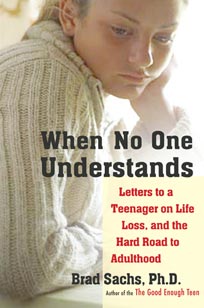
ORDER THE BOOK
READ PROLOGUE
DISCUSSION GUIDES
READ FIRST 3 LETTERS
READ Q & A
Download Discussion Guides
FOR PROFESSIONALS
- What are you recollections of your own adolescence, and in what ways do those recollections inform the work that you are engaged in with teens?
- What is your understanding of the major developmental tasks of adolescence?
- What is your understanding of the major developmental challenges that adolescents have always faced?
- What is your understanding of the major contemporary developmental challenges that adolescents currently face?
The author struggles to resist the temptation to diagnose Amanda with a specific emotional disorder, even when she requests one.
- What are the advantages and disadvantages of viewing adolescents through a diagnostic lens?
The author describes his role as “taking a therapeutic axe to the frozen sea of (Amanda’s) family’s assumptions, contaminating the trancelike perspective they had adopted…”
- How do you balance the need to accept, respect, and join with your patients where they psychologically reside, while simultaneously attempting to dislodge the limiting beliefs that may have contributed to their needing to consult with you?
The author notes that clinical symptoms can sometimes be better understood as “failures of the imagination rather than failures of the individual”.
- In what ways have you been taught to allow your imagination to “fail” you and your patients, and what have you tried or done to rejuvenate it?
The author avers early on that “unconventional therapy (with adolescents) is often the most effective therapy”.
- How have you found ways to strike a balance between traditional treatment and innovative intervention in your work with your patients?
The author attempts to make a distinction between being “responsive to patients” and being “responsible for patients”, between “providing relief, resolution and healing ” and inviting the patient to “discover relief, resolution, and healing”.
- When, for you, has the line blurred between being “responsive to” and being “responsible for” your patients, between “providing for them” and “inviting them to discover”, and how have you attempted to demarcate this line more clearly?
The author defines his correspondence with Amanda as a therapeutic “starting point” rather than an “ending point”, a way to lay the foundation for the family therapy sessions that he believed were eventually going to be crucial to Amanda’s, and her family’s, growth and development. He also refers to the therapeutic tightrope he had to walk between maintaining an alliance with Amanda while strengthening, solidifying and supporting her parents.
- How do you balance your efforts and desire to connect with adolescent patients while still attending to the family system as a whole?
- When are your loyalties to one generation or the other, or one parent or the other, in conflict, and how do you attempt to resolve the conflict?
The author recognizes his desire to compete with Amanda’s parents in an effort to become a better “parent” to her than they are.
- When working with adolescents, how do you monitor your tendency to want to outdo their own parents and your investment in becoming more influential and better loved by the teen than their own mother and father are?
- How do you manage treatment when you have disappointed and disillusioned your adolescent patients—when, after having established trust and reciprocity, they become hurt and enraged by a perceived rupture in empathy, affection and/or closeness?
- What have you done or been tempted to do that is unproductive in the face of this rupture, and what have you done or would you like to do that would be more productive?
The author writes of his belief in the importance of understanding and identifying with Amanda’s sense of the “hopelessness of it all”, and the necessity of sharing in that experience so that she is not left alone with it.
- To what extent do you allow yourself to identify with your patients’ despair, and what is it like to do so?
- How do you join with them around their despair without completely succumbing to it?
- How do your feelings of anger towards and frustration with your patients for making you feel so bleak and helpless manifest themselves, and how might they best be embraced and channeled in the therapeutic relationship?
The author discusses the “limits of influence” that clinicians have over our patients, no matter how skilled, caring and expert they may be.
- How do you make sense of and come to terms with the limits to the influence you have over your patients?
- How do you know the difference between thoughtfully and respectfully acknowledging one’s limitations and simply giving up or tossing in the towel?
